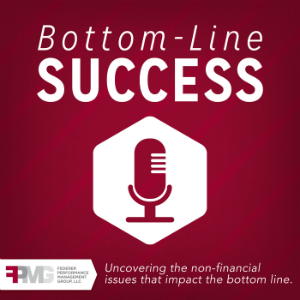Announcer: Hello, and welcome to Bottom-Line Success with Denise Federer, the podcast that guides successful business advisors and family business executives to be their very best. I’m your announcer, Emily Von Sydow. Today, we’re going to talk about difficult conversations in family businesses.
Denise, in a family business, it seems like the stakes are always higher because there’s more relationship there; it’s not just a working relationship. Do you have any advice for approaching a difficult conversation within the context of a family business?
Denise Federer: I think, Emily, you raise an essential point that in the best of situations, families can have difficult and complicated relationships. There is often sibling rivalry or jealousy or power struggles between parents and adult children, so it plays out even on a larger scale in a family business because it doesn’t just affect your ability to sit down and have a family dinner, but it affects your bottom line of the company as well. While it’s difficult to have sensitive conversations, it’s essential. I think what you have to do first before having that conversation, the person who wants to initiate it, is ask yourself the truth about what’s going on.
There’s two types of conflicts that occur in family businesses, or in any family, but in family businesses. One is a surface issue or kind of it’s a simple conflict. It’s about the here and the now. It’s about things like boundaries aren’t being respected in the workplace, people where there’s some sort of power struggle, compensation differences. People are concerned about how they’re communicating. Those are things that can be dealt with directly where you really focus on the behavior and you don’t attack the person. You simply describe what you need and the goal is to be more transparent about what you need to do your job better and to feel more respected.
What makes it more complicated is when you have a much more longer history of issues and what we call underlying issues. Some of those things are just feeling not respected, feeling patronized or you haven’t been taken seriously. Perhaps you have a role in the family. You’ve always been the youngest and people have never allowed themselves to see you as an adult or see you competent. Sometimes you see that there’s lack of trust between family members or a sense that things aren’t fair and favoritism.
While there’s a lot to digest there, I just think the best way to approach it is assess first what do you think the surface issues are, what do you think the underlying issues are, and ask yourself very specifically, if you’re the one initiating, what is your goal of the outcome of that conversation and describe for that person what you need and what you want them to do differently. Strive to focus on behaviors and discuss behaviors, not the person themselves.
A: That sounds like good advice for having difficult conversation in any context. Specifically talking about family businesses, it definitely makes sense that you have your surface problems and then your underlying issues. Would you say that underlying issues tend to be more common in a family business context as opposed to any other type of business?
DF: It’s interesting. I do consulting to non-family businesses and I certainly see people feeling patronized and jockeying for power and not trusting one another. The difference is they get to go home to sort of a safe environment where they can get re-energized and don’t have to deal with it 24 hours a day. The problem in a family business is that it can bleed into both the business aspect and the family aspect if you don’t set those appropriate boundaries and expectations of professional behavior in the work setting.
A: When you’re having a difficult conversation in a family business, do you find that it’s typically better to appeal to the needs of the family as a whole or the individual or to appeal to the needs of the business?
DF: That’s a pretty interesting question, and that goes back to what is the focus of the business and what are the values in the family. There’s three general types of family businesses. The first one, the value system is family first. No matter what decision we make, we make it in the terms of what is the best needs of family members regardless of how it impacts our financial well-being of the business or impacts how we function or impacts the non-family members. That’s called family first, and it can be problematic, as you can imagine, particularly when you’ve agreed to take on family members in roles that they may or may not be qualified for or decide that we’re paying everybody equal regardless of whether they’ve earned it.
The second is business first, and it really doesn’t take much into consideration the family needs. While it might be great for the business, not so much for the family when you’re trying to have Thanksgiving dinner together. The third, which is, hopefully, not too idealistic, but where I like to see family businesses working is the family business enterprise where you care about family members, you care about their needs, but it’s in balance with the business needs. A saying I often say is feel like a family, run like a business, that you have a level of professionalism, that you identify what we call governance rules and issues and how we’re going to handle things and what the priorities are so that when conflicts come up, there already are solutions in place and people have guidelines of how to resolve issues and not left to the heat of the moment.
A: When you’re either running a family business or you work in a family business, how do you know for sure whether it’s family first or business first? Because when you’re in an entity, sometimes it’s a little hard to classify it properly.
DF: I think, particularly if you’re running the business, and the owners of the business are the parents, usually, and you start to identify that the child or the cousin or the aunt that’s in a role is not performing their function, you’re seeing that it’s derailing their department, that they’re not producing, that it’s negatively impacting the bottom line. When you start finding yourself their work values are different, ethics of how they’re approaching their work, you start to realize that it’s time to shift from just thinking of them as a family member but thinking about what’s in the best interest of the entire organization.
Oftentimes, people find themselves starting to feel dissatisfied with the performance of a family member and when they look to the truth of why that is, they start to realize that they have shifted in how they started to view the business. It’s no longer the family piggybank, but we have a mission and a vision and the responsibility to other employees and to our clients to perform at the highest level and our expectation is that every employee and especially family members need to adhere to our values and performance expectations.
A: Would you say that most businesses start as family first and shift either hopefully into family business enterprise but possibly into business first?
DF: I would think so, particularly entrepreneurial. Yes. I would think most family businesses start off with an entrepreneurial spirit of somebody creating something and then it grows and they create a structure and then it turns into a more formalized business. That would be the natural growth pattern of all businesses. Yes, I would agree with that assessment.
A: That’s something to think about then if you do work in a family business. If you’re in the earlier stages, you’re much more likely to be in the family first stage and all of the potential advantages and disadvantages of that.
DF: That is why I encourage people from the beginning to take a proactive stance and develop what I’ve called and other people in industry have called governance rules. The more you can set up policies in advance of how you want to handle family members and what the expectations for entry, promotion, education, salary, all those issues before you have a conflict, the smoother it can run and the more you can ensure that you’ll maintain personal relationships as well as professional ones.
A: Then that goes back to having a difficult conversation when you have those guidelines, those rules set before you even start. I’m sure it makes the conversation at least a little bit easier.
DF: I think so. I think you have to go in with your best case scenario of how you want the outcome to go as well as, of course, with your worst case. Conflict is not easy, sharing painful information. When you have those conversations, you want to describe behavior. You don’t want to say, “Johnny, you’re so lazy.” You want to say, “Johnny, we have our employees come in at 8:00 and as owners, the expectation is that we come in at 7:00 every day and we are the last ones to leave at 6:30; we don’t leave at 4:30.” You define what you need and describe behavior.
A: When you’re in the context of a family-first business, it would probably make sense then when you’re addressing a difficult conversation that you do want to appeal to the needs of the family or the individual over the needs of the business. Would that be accurate?
DF: I think so. I’ll just use the example as a parent, that’s certainly a relationship that’s hard to separate. You care deeply about your child and want them to be happy. You have to sort of ask yourself what has to happen for their needs to be met. It may not always be in the context of working in the business. I’ve had situations where I’ve had to guide parents to remove children from certain roles but shift and find them a better fit. It’s about finding the right fit. It’s about deciding if that person is in sync with your values and is not derailing the company but simply in the wrong role, that’s one thing. If they’re doing things that are destructive to themselves and the company, then that’s another difficult decision you have to make of whether they belong there or not.
A: When you do have the difficult conversation and you’re focusing in on the behaviors that you see and then the behaviors that you need to see, what outcomes can you expect from having that conversation?
DF: I think everybody has a history with the people that they’ve lived with in their family, so you usually predict your future behavior from past behavior. If you know in the past that an individual gets defensive when you share information, I think you need to prepare for that and give them some time to review what you said, come up with their response. You don’t want it to be a defensive response, but we tend to get defensive when we feel attacked. You have to be very careful that you use a respectful tone, that you treat them as an adult, that you give them a chance to share their input and then talk about what next. The outcome really has to be determined from the two of you.
You may be sending them away to resolve certain issues, think about a problem. You might tell them this is how I’d like to see it. But realize that people will engage in behavior the more you allow them to be collaborative in the discussion and then the decision of what the outcome will be. You might find if in the past at home people storm off and they don’t speak to you when you’ve said something hurtful, you need to really be clear that that behavior is not acceptable in the work setting, that when we’re at work and we have something to discuss, we take it to the end and the level of professionalism that you’re expecting, and you need to model that. I’ve seen certain family businesses where a husband and wife work together and fight while the employees … That’s not a good professional model to give everybody.
A: Would you say that you’re approaching a difficult conversation depending on your generational position? For example, if you have a parent who’s addressing an issue with a child or vice versa, a child addressing an issue with the parent, is there a difference in how that individual should approach the conversation based on their position?
DF: I believe so. I think respect is essential both ways, but there is no doubt about it that an older generation, everyone I’ve work with, really does expect a certain tone and attitude to come from a younger generation. You also have your own history and dynamics. If you grew up in a family where you weren’t encouraged to voice your opinion, I’ve seen adult children really be passive and sometimes passive aggressive instead of communicating directly to their parent what they’re thinking and feeling. It’s very difficult to change the dynamics in the work setting that already existed in the personal setting. The healthier you can get in your personal relationships, the healthier the business relationships will be. But at least to find some minimum expectations of how we’re going to treat each other at work.
A: What happens if one of these difficult conversations doesn’t go well? How do you deal with that aftermath?
Denise: I think it’s really important to be as prepared as you can and anticipate what you think might happen. I think you always want to leave the conversation with next steps. Then another serious consideration is when is it time to take it out of the business and make it more personal and perhaps if you’ve had a history of going to a family therapist or perhaps get a professional to help you have these conversations and work through the pain.
I recently ran a meeting of a father and several daughters and a son from a family business about how some changes needed to be made in the leadership role of the father as well as the adult children. At the end of it, the comment made to me by the mom, who was also there, was, “Thank you so much because at least there were no tears, hysterics, and nobody ran out the door.” Just by my physical presence and helping them bring it back to it being an adult, professional conversation, they were actually able to work through some of their concerns and discuss certain solutions about taking it as a personal attack.
DF: Definitely that makes a lot of sense. Sometimes just having that other person in the room is enough of a disincentive to extreme behavior.
A: Which can really make a huge difference. What would you say are the signs that maybe you need to bring in a professional, either someone to help you purely as a family therapist on a personal level or on a more business level or a combination thereof? What are some of those signs that you should be on the lookout for that maybe you need to consider hiring someone?
DF: I think when you see a marked change in how someone is relating to you, if one of the family members is withdrawing or showing intense levels of anger. Certainly, if there’s any history of substance abuse, that’s a difficult conversation to have without a professional. Again, I think we trigger things in one another, and if you see that old tapes are being played and old behaviors and extreme behaviors and out-of-control behavior. I’ve seen family businesses where people really lose control and have an intense level of anger. I think that’s time when you need professional intervention. From my value system primarily to repair your personal relationship, but certainly also because it will impact your business and the non-family members in your business to a severe degree if you don’t resolve communicating more effectively.
A: Definitely. I can’t even imagine being just a non-family member employee in a family business and having a massive argument between family members. I can’t even begin to imagine.
DF: As you said, it’s awkward, it’s uncomfortable and unprofessional, and it will derail the entire business and level of trust and respect amongst all the employees. I’ve worked in companies that have 500 people and it’s a family business, and I’ve worked in companies that have five people and it’s a family business. It’s the same dynamic. You have to approach the business setting in a professional manner, with respect, as you would treat any non-family individual. I think it’s important to establish your expectations of behavior. Everything from what time do you arrive and what time do you leave to what tone of voice do you speak to employees in to what’s the scope and limits of your responsibility and authority.
A: I definitely see the value of setting those guidelines. When should those guidelines be set? Should they be set as soon as you start the business? Or is that something that maybe you need to wait and see how the business develops before you set those guidelines?
DF: I think it should be discussed from the very start. I think you want to set people up to really understand their expectations, with the understanding that as you grow and you interact with each other and you learn more and more about your children’s skill sets and they learn more about yours, you can revisit that conversation at any time. Clearly, the more you can set up for people what you need from them, what you expect from them, the more effective it will be and the more powerful their relationship with you will be.
A: I hear what you say about the guidelines and I definitely see the importance of that, and I’m sure that sometimes these guidelines have to be developed after you have a difficult conversation. Is there ever a time when you should avoid having a difficult conversation?
DF: I think when there is a serious history in the family of either violence or substance abuse or somebody being depressed and you are concerned about their ability to handle that type of feedback, it’s important that you put appropriate professionals in place and decide up front how you’re going to help manage that person’s reactions. You usually predict future behavior based on past behavior, so most families know what type of history there is and their interactions are not taken totally by surprise. If it’s focused just on business, you might want to bring in a business consultant such as myself, a family business consultant. Or if it’s really much more about the person’s individual psychological issues or ability to cope, then you certainly want to bring in a personal family psychologist to work with you.
A: Then if you are in a situation where you do need to bring in a professional, should you just approach that professional without notifying the individual in question? Because I can see how that can be perceived as perhaps even ganging up on someone. Is that something you just talk to the professional and then they make an assessment and come up with a plan for how to address it from the very beginning?
DF: I think that’s exactly how you handle it. In the situations where I work with family businesses, I certainly get contacted by the person who owns the company usually and sometimes by the adult children. But I think I will never be a part of a triangle or in a hidden agenda, talk to someone. Usually, it’s never just one person’s issue anyway; it’s a systems issue. If I come in, I work with everybody involved. Even if someone has pre-identified an individual as they’re the problem, that’s what we often call scapegoating, and I don’t accept their assessment. I assess everybody involved and work with everybody involved and make my own determination of where the issues are, and it’s never one-sided.
A: What can you expect if you do bring in a professional? What kind of outcomes can you expect? It sounds like it’s very overwhelming to be working in a family business. Is there really even any hope? If a problem does develop, can it be fixed?
DF: No. It’s exciting and wonderful and a sense of commitment and belonging and a sense of pride to work in a family business. Most companies, and our company and even internationally more so, are family businesses. I know I’m kind of bringing up the potential issues, but I’ve had some amazing successes.
One example I have is there’s a family business that I worked with where the adult daughter was really the wrong person to be running a division. There was a lot of difficult, insecure feelings that she had about her relationship. She was from a first marriage. The father is now married to a second person who she had a good relationship with but still felt that she wasn’t totally as involved in the company as she would have liked and there were other children from the second marriage. After working with her individually, working with the entire family, working with the father, we found the best fit for her, and she is totally thriving and all the relationships are healthy. Sometimes it’s just about best fit when I meet with families and I realize there is a commitment for that child to stay in the businesses, find a spot.
In another case, I worked with a family which was a huge family on their maybe fourth generation family business. It was a business first. There were many rules in place. This adult child in the business, again another daughter, really wanted to stay in the business and wasn’t qualified. My job was to kind of come in and help her understand how she could maintain a relationship with the family business through some of their foundation and philanthropic work and third and fourth generation work as well as what was her best fit in life for her role. Again, in that case, in both cases, it was how do I preserve the family relationship first but find out what’s good for the individual and the business.
A: Excellent. It’s great to hear the success stories because you really do feel sometimes when you’re in the midst of a problem that there is just no hope for a solution, but there really is, and there are a lot of advantages to working in a family business.
DF: Absolutely. I think there is just a sense, as I said, of loyalty and legacy and pride. The key to being successful in a family business is communication, being transparent, being up front, being honest, and managing your emotions effectively and kind of creating those boundaries.
Emily: On that note, I’d like to wrap this up. If you’d like to learn more about Dr. Federer’s words of wisdom, you can check out her website, which includes her blog, at federerperformance.com.








